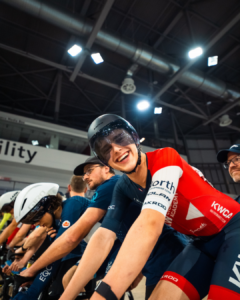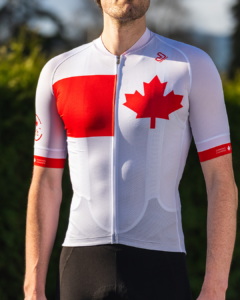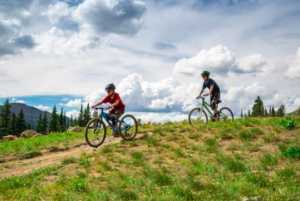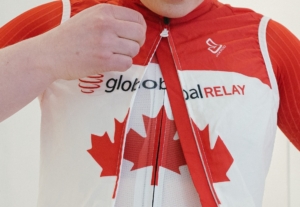BIG MACS AND SUPERHUMANS
By Jesse Korf, Pathway Development Manager with Cycling Canada and PhD candidate at the school of Kinesiology and Health Sciences at York University
Allow me to try and blow your mind.
Attempt number one: professional road and mountain bike athletes may spend one thousand hours a year training and racing. That’s about the same amount of time it will take you to drive from Toronto to the southern-most tip of Patagonia…five times.
Not impressed? How about this one?
Over the course of the Tour de France, the total energy intake for a single cyclist might rise to 168.000Kcal, that’s the equivalent of a staggering 305 Big Macs!
These are just two of the countless amazing factoids in the world of mind-boggling human feats that is elite cycling. Our top athletes are incredible, and it is this, the quest to push the boundaries of what humans are capable of and helping people chase their dreams, which makes working at this level in sports so exciting.
Here, we will explore a three-step approach to greatness for world class cyclists or anyone who is serious about getting seriously good at what they do. You can use this approach as a guide to go on a journey and unlock your full potential. You will be shocked and amused how much you can unpack and explore when you think about your craft and do a little research.
Here is the approach:
- Find your why/your purpose
- Fill your four buckets
- Big rocks and marginal gains
Step 1: Find your WHY
This is an essential first step. So, you decided you want to be an Olympic champion or maybe a special forces operator, perhaps become a world-class lawyer. Great! But merely deciding you want to do this is likely not enough. Why? Well, without serving a bigger purpose or exploring what fuels this inner fire, it will be very hard to stay committed during rough patches and in times of doubt. And those times will inevitably come.
Take your time to really explore your why and make sure it is both authentic and something that is near and dear to you. For me, there is nothing that sparks my interest more than exploring what sets apart the very best athletes on the planet and help people that have the ambition to become great, get there. My mother owned a gym and my dad was a Phys Ed teacher. Helping people improve their physical and mental health utilizing sports is what they did, what I grew up in. The source of my curiosity and my WHY are directly traceable to this formative environment. What is yours?
Step 2: Fill your four buckets
At this point, you might ask yourself: so, what are the ingredients of unlocking human potential? Any sport or occupation consists of four categories of ingredients:
- Physical
- Technical
- Tactical
- Cognitive
Think of these four as buckets with a couple of tiny holes in them. You want to continually try to add to your buckets and if you leave any of them for too long, they gradually drain.
Let’s go one level deeper. If we are to project cycling into this example, we might further distinguish two types of sub-ingredients to fill your physical bucket. On-bike and off-bike. Off-bike including items like core strength, ankle stability or flexibility. On-bike could include your 20-mins power, your 4-minute power, your leg speed or your yearly volume. Let’s take the latter to illustrate a scenario. Say, you are 18 years old and aspire to compete in the Tour de France or Giro Rosa, knowing that you need to be able to handle 1,000 hours of volume at that level. Exercise physiology teaches us that after you start training seriously, you can roughly increase your annual volume by 5 to 10%. Knowing that, if you aim to do that race at age 24, how much should you be training now? It’s simple math.
Each sport and profession have their own unique mix of physical, technical and tactical demands. What is interesting is that many items that you might consider for your cognitive bucket, seem to be more universal and apply to all kinds of sports and walks of life. As such, some of them are finding their way in to pop culture and regularly hit the best-sellers lists. These include “Grit” and having a “Growth Mindset”. You might have already read about them. Other universal cognitive skills include the ability to overcome adversity – or resilience – the ability to self-evaluate, coping with pressure and others.
Step 3: Big rocks and marginal gains
Team Sky made the moniker “marginal gains” famous. This approach implies that no stone that can increase performance – or decrease the impact of items that dampen performance – should remain unturned. While hugely impactful as a philosophy, it is important to also remember that there are big rocks alongside marginal gains. Getting a fancy new jockey wheel with ceramic bearings might increase your drivetrain efficiency ever so slightly. While improving your nutrition, sleep and recovery have a vastly larger effect on your performance and could be called big rocks.
If your name is Ross Wilson, Emily Batty, Kelsey Mitchell or Mike Woods, your nutrition, sleep and recovery are of vital importance to both the ability to train and the ability to perform.
Nutrition and sleep share the same universality as the cognitive items mentioned previously and are the most common areas in which both fast and significant improvement in performance can be found. Of course, not all big rocks that present themselves are general. A domain specific example in cycling of big rocks over marginal gains might be prioritizing improving your position on the bike over getting a lighter saddle. While working on your position might, let’s hypothetically say yield a 5% increase in performance, your new saddle that shaves 50 grams off your bike might only account for a 0.01% increase. Always identify your big rocks and take care of them first.
Concluding, here is my challenge to you: you now should have a framework to build a roadmap that will unlock your potential. What is it that makes you tick and how are you going to become superhuman at it?








